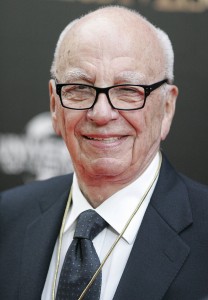Will Rupert Murdoch dominate the media landscape in the near future? Maybe.
Time Warner rejected an $80 billion takeover offer from Rupert Murdoch’s 21st Century Fox and confirmed that it has no other interest in speaking with the media entertainment juggernaut. It was noted that Murdoch’s empire offered last month a combination of its stock and $32.42 in cash for every Time Warner share.
After deliberating with financial and legal advisers, Time Warner’s board decided to reject the offer and stated that its strategy will allow the company to be more valuable and far “superior” to any bid that Murdoch may offer, though his offer would have been 20 percent higher than its stock is worth.

“Time Warner’s Board also noted the consistent track record of Time Warner’s proven management team in achieving superior returns as well as completing a series of transactions to unlock value in related businesses, including the separation of AOL, Time Warner Cable, and Time Inc.,” Time Warner said in a statement.
Under its strategic plan, Time Warner has delivered a total shareholder return of more than 150% since 2008, almost tripling the return of the S&P 500 over the same period, as management has pursued a disciplined approach to position the Company as a global leader in media and entertainment while managing its operations and capital structure to maximize shareholder returns.
Following the news, Time Warner’s shares skyrocketed 17 percent during the early Wednesday morning trading session.
Twenty-First Century Fox announced the proposal in a separate statement and pointed out that Time Warner had simply rejected the offer. It refused to provide any more details. However, it is being reported that Murdoch is determined to strike up a deal
Time Warner currently owns a number of established brands, including HBO, Warner Bros. studios and CNN – 21st Century Fox would have sold off CNN and its various properties, such as the news network’s cable and satellite television station, various support websites and other specialized channels (HLN, n-tv and CNN Airport Network), in order to avoid anti-trust issues and allow Fox News to compete directly.
Experts concurred that it would have caused tremendous regulatory strife in the U.S.
“However improbable it may seem, one cannot overlook this mega deal given its immense financial benefits that dovetail with a number of strategic benefits like the added sports rights, studio market share, TV production synergies, large content library, news programming synergies, distribution savings, and brand compatibility,” wrote Janney Montgomery Scott LLC media analyst Tony Wible last month, according to CNN Money. “Any deal would have to cope with overlapping networks and would very likely face more regulatory scrutiny.”
ABC, ESPN and CBS would have been candidates to acquire CNN if the deal went through. Fox would have likely held on to TBS, TNT, HBO and Warner Bros. studios and combined them with its successful FX, Fox News and Fox Sports 1 brands.




